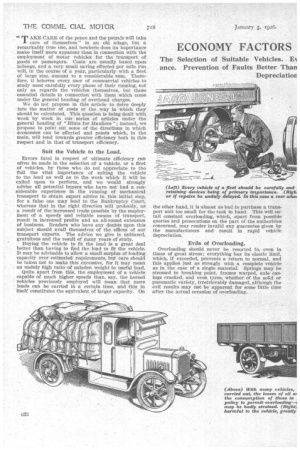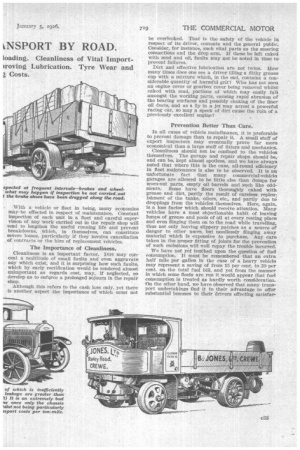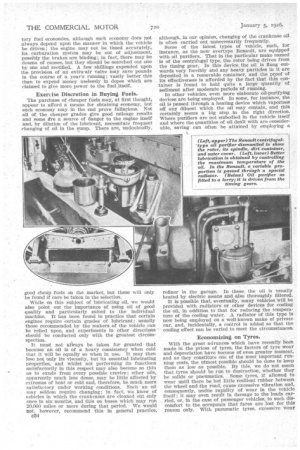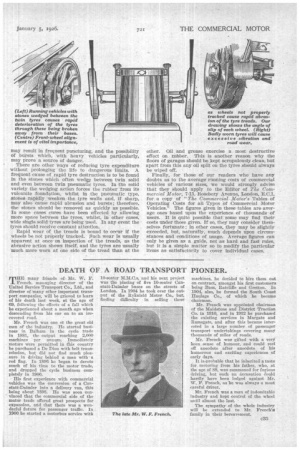ECONOMY FACTORS
Page 16

Page 17

Page 18

Page 19

If you've noticed an error in this article please click here to report it so we can fix it.
LNSPORT BY ROAD.
The Selection of Suitable Vehicles. EN ance. Prevention of Faults Better Than Depreciation
loading. Cleanliness of Vital Import)roving Lubrication. Tyre Wear and a Costs. " rp ARE CARE of the pence and the potimis will take I care of themselves" is an old adage, but a remarkably true one, and nowhere does its importance make itself more apparent than in connection with the employment of motor vehicles for the transport of goods or passengers. Costs are usually based upon mileage, and a very small saving effected per mile run will, in the course of a year, particularly with a fleet of large size, amount to a considerable sum. Therefore, it behoves every user of commercial vehicles to study most carefully every phase of their running, not only as regards the vehicles themselves, but those essential details in connection with them which come under, the general heading of overhead charges.
We do not propose in this article to delve deeply into the matter of costs or the way in which they should be calculated. This question is being dealt with Week by week in our Series of articles under the general heading of "Hints for Hauliers "; instead, we propose to point out some of the directions in which economies can be effected and points which, in the main, will tend towards greater efficiency both in this respect and in that of transport efficiency.
Suit the Vehicle to the Load.
Errors fatal in respect of ultimate efficiency can often be made in the selection of a vehicle, or a fleet of vehicles, by those who do not appreciate to the full the vital importance of suiting the vehicle to the load as well as to the work which it will be called upon to perform, and we would strongly advise all potential buyers who have not had a considerable experience in the running of mechanical transport to obtain expert advice in this initial step, for a false one may lead to the Bankruptcy Court, whereas that in the right direction will probably, as a result of the increased trade possible by the employment of a speedy and reliable means of transport, result in increased profits and an all-round extension of business. Readers who have any doubts upon this subject should avail themselves of the offices of our transport experts. The advice we give is unbiased, gratuitous and the result of many years of study.
Buying the vehicle to fit the load is a great deal better than having to find the load to fit the vehicle. It may be advisable to allow a small surplus of loading capacity over estimated requirements, but care should be taken not to make this excessive, for it may mean an unduly high ratio of unladen weight to useful load.
Quite apart from this, the employment of a vehicle capable of much higher speeds than, say, the horsed vehicles previously employed will mean that more loads can be carried in a certain time, and this in Itself constitutes the equivalent of larger capacity. On
the other hand, it is almost as bad to purchase a transport unit too small for the task in hand. This will entail constant overloading, which, apart from possible queries and prosecutions on the part of the authorities concerned, may render invalid any guarantee given by the manufacturers and result in rapid vehicle depreciation.
Evils of Overloading.
Overloading Should never be resorted to, •even in times of great stress; everything has its elastic limit, which, if exceeded, prevents a return to normal, and this applies just as strongly with a complete vehicle as in the case of a single material. Springs may he stressed to breaking point, frames warped, axle casings cracked, and even tyres, whether of the solid or pneumatic variety, irretrievably damaged, although the evil results may not be apparent for some little time after the actual occasion of overloading. With a vehicle or fleet in being, many economies may be effected in respect of maintenance. Constant inspection of each unit in a fleet and careful supervision of any work carried out in the repair shop will tend to lengthen the useful running life and prevent breakdowns, which, in themselves, can constitute severe losses, particularly if they involve cancellation of contracts or the hire of replacement vehicles.
The Importance of Cleanliness.
Cleanliness is an important factor. Dirt may conceal a multitude of small faults and even aggravate any which exist, and it is surprising how such faults, which by early rectification would be rendered almost unimportant as regards cost, may, if neglected, so develop as to enferce a prolonged sojourn in the repair shop.
Although this refers to the cash loss only, yet there is another aspect the importance of which must not be 'overlooked. That is the safety of the vehicle in respect of its driver, contents and the general public. Consider, for instance, such vital parts as the steering connections and the drop arm. If these be left caked with mud and oil, faults may not be noted in time to prevent failures.
Dirt and effective lubrication are not twins. How many times does one see a driver filling a filthy grease cup with a mixture which, in the end, contains a considerable quantity of harmful grit? Who has not seen an engine cover or gearbox cover being removed whilst caked with mud, pertions of which may easily fall; amongst the working parts, causing rapid abrasion of the bearing surfaces and possibly choking of the finer oil ducts, and as a fly in a jet may arrest a powerful racing car, so may a speck of dirt cause the ruin of a previously excellent engine?
Prevention Better Than -Cure.
In all cases of vehicle maintenance, it is preferable to prevent damage than to repair it. A small staff of expert inspectors may eventually prove far more economical than a large staff of fitters and mechanics.
Cleanliness should not be confined to the vehicles themselves. The garage and repair shops should be, and can be, kept almost spotless, and we have always noted that where this is the case, all-round efficiency` in fleet maintenance is also to be observed. It is an unfortunate fact that many commercial-vehiclet garages are allowed to be little else than dumps for worn-out parts, empty oil barrels and such like oddments. Some have floors thoroughly caked with grease and dirt, partly the result of careless replenishment of the tanks, oilers, etc., and partly due to droppings from the vehicles themselves. Here, again, Is a loss factor which should receive attention. Many vehicles have a most objectionable habit of leaving lumps of grease and pools of oil at every resting place and even flinging them on to the road while travelling, thus not only leaving slippery patches as a source or danger to other users, but needlessly flinging away material which is expensive to purchase. Any care taken in the proper fitting of joints for the prevention of such emissions will well repay the trouble incurred.
We have not yet touched upon the question of fuel consumption. It must be remembered that an extra half mile per gallon in the case of a heavy vehicle may represent a saving of from 15 per cent. to 20 per cent. on the total fuel bill, and yet from the manner in which some fleets are run it would appear that fuel consumption is treated as hardly worth consideration. On the other hand, we have observed that many transport undertakings find it to their advantage to offer substantial bonuses to their drivers effecting satisfac
tory fuel economies, although such economy does not always depend upon the manner in which the vehicle be driven; the engine may not be timed accurately, its_ carburation system may be out of adjustment, possibly the brakes are binding; in fact, there May be dozens of causes, but they should be searched out one by one and rectified. A few shillings expended upon the provision of an extra-air valve may save pounds in the course of a year's running; vastly better this than to expend money uselessly in dopes which are claimed to give more power to the fuel,itself. .
Exercise Discretion in Buying Fuels.
The purchase of cheaper fuels may, at first thought, appear to afford a means for obtaining economy, but such economy may in the end prove fallacious. Not all of the cheaper grades give good mileage results and some the a source of danger to the engine itself and, by dilution of the lubricant, necessitate frequent changing of oil in the sump. There are, undoubtedly, good cheap fuels on the market, but these will only be found if care be taken in the selection.
While on this subject of lubricating oil, we would also point out the importance of using oil of good quality and particularly suited to the individual machine. It has been found in practice that certain engines require certain grades of lubricant ; usually those recommended by the makers of the vehicle can he relied upon, and experiments in other directions should be conducted only with the greatest circumspection.
It must not always be taken for granted that because an oil is of a heavy consistency when coldthat it will be equally so when in use. It may then lose floc only its viscosity, but its essential lubricating properties, and whilst not performing its functions satisfactorily in this respect may also become so thin as to exude from every possible crevice; other oils, apparently much less dense, may be little affected by extremes of heat or cold and, therefore, be much more satisfactory under working conditions. Such an oil may seldom require changing; in fact, we know of vehicles in which the crankcases are cleaned out only once in six months, and this on buses which may run 20,000 miles or more during that period. We would not, however, recommend this in general practice, c34
although, in our opinion, changing of the crankcase oil is often carried out unnecessarily frequently.
Some of the latest types of vehicle, such, for instance, as the new overtype Renault, are equipped with oil purifiers. That in the particular make named is of the centrifugal type, the rotor being driven from the timing gear. In this device the oil is flung outwards very forcibly and any heavy particles in it are deposited in a removable container, and the proof of its effectiveness is afforded by the fact that this container is found to hold quite a large quantity of sediment after moderate periods of running.
In other vehicles, even more elaborate oil-purifying devices are being employed. In some, for instance, the oil is passed through a heating device which vaporizes off any diluent which the oil may contain, and this certainly seems a big step in the right direction. Where purifiers are not embodied in the vehicle itself and where the quantities of oil dealt with are considerable, saving can often be attained by employing a refiner in the garage. In these, the oil is usually heated by electric means and also thoroughly filtered.
It is possible that, eventually, many vehicles will be provided with radiators or other devices for cooling the oil, in addition to that for reducing the temperature of the cooling water. A radiator of this type is now being employed on a well-known make of private car, and, incidentally, a control is added so that the cooling effect can be varied to meet the circumstances.
Economizing on Tyres.
With the great advances which have recently been made in the prices of tyres, the factors of tyre wear and depreciation have become of even greater moment, and as they constitute one of the most important running costs, the utmost possible should be done to keep them as low as possible. By this, we do not mean that tyres should be run to destruction, whether they be solids or pneumatics. Some 'tyres, if allowed to wear until there be but little resilient rubber between the wheel and the road, cause excessive vibration and, consequently, undue rapidity of wear in the vehicle itself ; it may even result in damage to the loads carried, or, in the case of passenger vehicles, to such discomfort to the occupants that fares are lost for this reason only. With pneumatic tyres, excessive wear
may result in frequent puncturing, and the possibility of bursts which, with heavy vehicles particularly, may prove a source of danger.
There are other ways of reducing tyre expenditure without prolonging the life to dangerous limits. A frequent cause of rapid tyre deStruction is to be found in the stones which often wedge between twin solid and even between twin pneumatic tyres. In tile solid variety the wedging action forces the rubber from its vulcanite foundation, whilst in the pneumatic type, -stones rapidly "weaken the tyre walls and, if sharp, may also cause rapid -abrasion and bursts ; therefore, the stones should he removed as quickly as possible. In some cases cures have been effected by allowing more space between the tyres, whilst, in other cases, Wide single solid tyres are being used. In any event the tyres should receive constant attention.
Rapid wear of the treads is bound to occur if the wheels be not properly tracked. Such wear is usually 'apparent at onceon inspection of the treads, as the abrasive action shows itself, and the tyres are usually much more worn at one side of the tread than at the
other. Oil and grease exercise a most destructive effect on rubber. This is another reason why the floors of garages should he kept scrupulously clean, hut apart from this any oil spilt on the tyres should always be wiped off.
Finally, for those of our readers who have any doubts as to the average running costs of commercial vehicles of various sizes, we would strongly advise that they should apply to the Editor of The Commercial Motor, 7-15, Rosebery Avenue, London, ROL for a copy of " Tim Commercial Motor's Tables of Operating Costs for all Types -of Commercial Motor Vehicles." The figures given in these tables are average ones based upon the experience of thousands of users. It is quite possible that some may find their costs under those given. If so, they may consider themselves fortunate; in other cases, they may be slightly exceeded, but, naturally, much depends upon circumstances and conditions of usage. Average figures can only be given as a guide, not as hard and fast rules, hut it is a Simple matter so to modify the particular items as satisfactorily to cover individual cases.
































